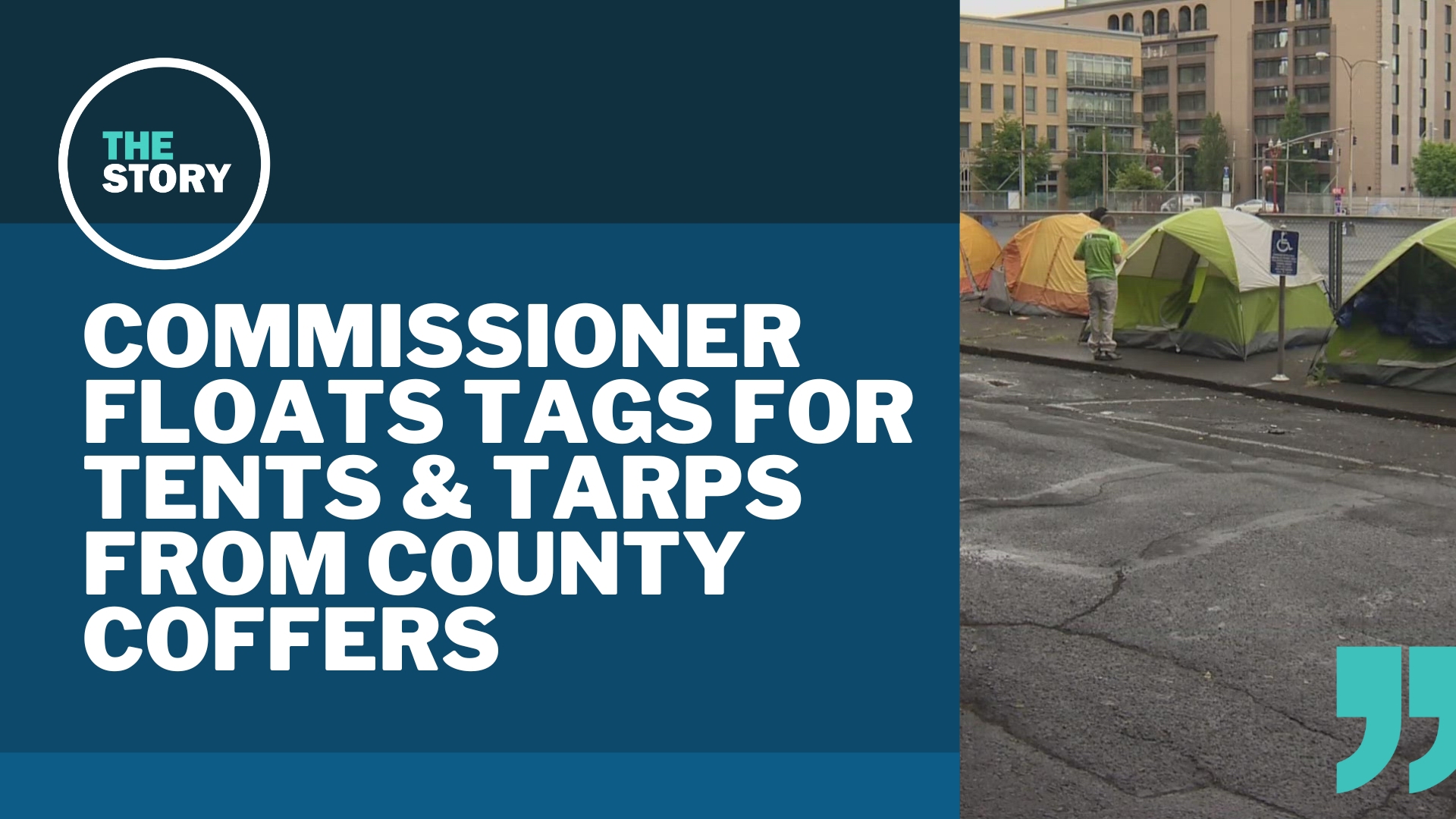PORTLAND, Ore. — Just a few weeks before Multnomah County is set to present the city of Portland with an updated policy around tent and tarp distribution, city commissioner and mayoral candidate Rene Gonzalez — who is part of a new Joint Office of Homeless Services steering committee — is proposing restrictions around how often county service providers can hand out those supplies, which for better or worse have become part of the fabric of Portland.
“I think we owe it to our taxpayers, to our residents to continue to fight to clean up our sidewalks,” said Gonzalez in an interview with KGW on Wednesday.
Gonzalez is proposing tighter restrictions around those efforts, including handing out smaller tents with yellow labels marking which ones the county pays for and only providing them during extreme cold weather.
“There’s a lot of confusion in the community as to where the tents and tarps are coming from, so part of the labeling is to just be transparent to taxpayers. If a government agency is handing those out, then we know those are coming from the government,” Gonzalez said.
Mayor Ted Wheeler's office would not say if they agreed with this proposal but told KGW they recognize the need for a “nuanced approach,” adding: “The City of Portland invests significant time, money, and resources in cleaning and removing tents and tarps throughout the community. The current rate of these cleanups is unsustainable. Additionally, the city must adhere to rights of way policies as dictated by various settlement agreements. This has become the city standard, and we will continue working with the county as they develop their own policy.”
Meanwhile, Gonzalez continues to call on the county to track the number of tents they hand out as well as who get them, where they end up and how they're being used.
“The reason for that is we know there is some level of criminal behavior going on in some of the tents and tarps on our streets,” Gonzalez said.
But for people like Lady, a 21-year-old homeless woman who stays under a Highway 30 overpass in Northwest Portland, a gray tarp is her main source of shelter as she struggles to find housing.
Throughout her four years on the streets of Portland, she's had countless tarps. And without them, life is just that much harder, she explained.
“You get sicker. It’s a lot more exposed to the community, like everything we own, (there's) less privacy ... and I mean, everyone deserves privacy. Everyone,” Lady said.
City commissioners will vote sometime after October 15 on whether they will continue sending millions of taxpayer dollars to the county-led Joint Office of Homeless Services. How the county responds to these proposed restrictions on tent and tarp distribution could be a deciding factor in that vote.
BACKGROUND: Portland city council votes to renew homeless services contract with Multnomah County for 3 more years
Multnomah County Chair Jessica Vega Pederson, along with the other county commissioners, were on a day-long retreat Wednesday, but county spokesperson Julia Comnes sent KGW the following statement on their behalf:
“When Multnomah County considers a new policy, we must look at what problem we’re trying to solve. In this instance, we know that far too many people do not have access to housing and shelter. As the community’s safety net, it is our role to provide resources for people living outside when their lives are at risk. We also need to be good partners and careful stewards of community resources and public spaces.
"While we work diligently to add more capacity for shelter and housing, we’re going to need to continue meeting people’s very basic needs. County leadership is engaged in ongoing conversations at the Steering and Oversight Committee, which is a good forum for sharing perspectives as the County contemplates a more formal policy.”
Mayoral candidate Keith Wilson likened Gonzalez’s proposal to a game, telling KGW:
“We need to end the games like debating whether or not to add signs or labels to tents and tarps before handing them out and start following the lead of cities that have solved unsheltered homelessness … Cities that have solved unsheltered homelessness rely on a network of cost-effective nighttime emergency shelters that enable them to enforce their existing laws on encampments and RVs. By contrast, this latest proposal is deeply unserious, and yet another frustrating sign of failed leadership in Portland.”
Mayoral candidate Liv Osthus sent KGW the following statement:
“Let’s be crystal clear: Portlanders view shelter as a human right. Tents are shelter. Until there is adequate supply and types of shelter to accommodate every Portlander, emergency shelter must be provided. Tracking who gets supplies and what those supplies are used for is deeply ironic and immoral in a city and county that have failed to collect any sort of data on the humans who make up our unsheltered population. Data of this sort would make a huge difference in how the JOHS delivers services, and its success rate. Gonzalez’s logic is flawed in that it destabilizes vulnerable people further, which in turn destabilizes our city.”
City commissioner and mayoral candidate Mingus Mapps said plainly that this issue would not impact his vote on the fate of the joint office.

